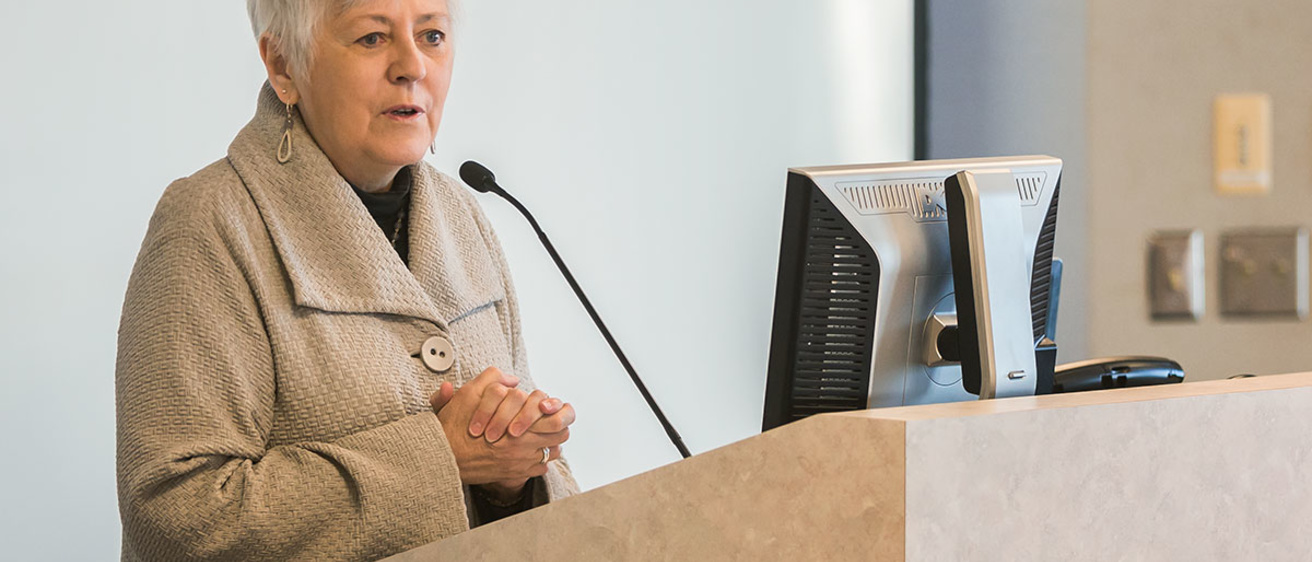University of Iowa President Sally Mason reaffirmed her commitment to preventing and punishing sexual misconduct during comments made Tuesday.
“I do want to make my position clear. I believe there is no excuse for sexual assault,” she said. “I have zero tolerance for sexual misconduct. I know that sexual assault is never the fault of the survivor.”
The comments came during the Feb. 25 Presidential Forum, a regular briefing for campus leaders. Mason opened her comments with an apology.
"Several members of our campus community have let me know that my remarks on sexual assault printed last week in The Daily Iowan were hurtful," she said. "I did not intend them to be, and I am sorry for the pain my words caused."
In the past week, students have led a call for measures that include additional assault-prevention resources and shifts in the wording of “Timely Warnings” issued by the university following assault reports.
"I don't see them as demands," Mason said of the students' proposals. "I see them as reasonable requests. We will be taking care of those requests in the very near future."
“The university will do everything in its power to prevent sexual violence, support survivors, and hold offenders responsible.” —Sally Mason
Student representatives met yesterday with Tom Rocklin, vice president for student life. Mason shared plans for continuing the discussion, including a listening session to be held Thursday, 3:30-5 p.m. in the second-floor ballroom at the Iowa Memorial Union.
See related story, Mason to lead listening session on sexual misconduct Thursday.
She outlined measures the university already has taken to combat sexual assault, domestic and dating violence, stalking, and harassment.
“The safety and well-being of every student is an absolute priority for every one of us on this campus,” she said. “The university will do everything in its power to prevent sexual violence, support survivors, and hold offenders responsible.”
She also emphasized the need for campus-wide collaboration and dedication: “I call on all of us to help protect each other and create a culture where survivors of sexual assault are supported and empowered.”
The university was among the first schools to appoint a sexual misconduct response coordinator, whose website, osmrc.uiowa.edu includes comprehensive information about reporting and support options.
The UI also has instituted mandatory training for students, staff, and faculty, and is strengthening its focus on bystander intervention. “Most fundamentally, we have seized every opportunity to confront sexual misconduct directly, talk openly about the problem, and together offer solutions,” Mason said.
Other forum topics
Mason also outlined the university’s priorities for working with state leaders, including a four percent appropriations increase and continued tuition freeze for resident undergraduates—the first two-year tuition freeze since 1975.
Planning for a new Pharmacy Building, proposals for regional economic development engagement centers, and support for a residential STEM academy through the Belin-Blank Center for Gifted Education and Talent Development also top the legislative priority list.
Mason also described two initiatives from the Iowa Board of Regents: a performance-based funding task force reviewing ideas for linking state dollars to outcomes like graduation rates, and an efficiency and transformation review assessing all three state universities. She reported that the performance-based funding task force intends to make recommendations in June.
The regents have contracted Deloitte Consulting Services for the efficiency study. Mason praised efficiency measures already instituted at the UI and noted that fresh eyes can help identify other areas of focus. She added that any savings realized will stay with individual universities to be reinvested locally.
Mason then introduced Joe Brennan, vice president for strategic communication, who described his goals for sharing the university’s story, building community, and creating trust with stakeholders.
Brennan emphasized refining the university’s message on topics like its statewide impact, enhancing communications collaboration across campus, assessing the tools available to campus communicators, and building capacity in key areas like media relations and digital/social media.
